JULY - AUGUST

'LIKE NASCAR ON SPEED'
Chariot Racing Might Return to Circus Maximus
By Josh Ward
07/16/2008
If one Italian entrepreneur has his
way, Rome's Circus Maximus will once again play host to roaring
chariot racing. It's time, he says, for Romans to once again leave
the Gauls and the Huns in their dust.
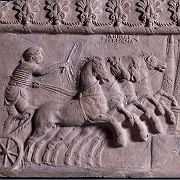
Ben-Hur Redux? An Italian entrepreneur is hoping to bring
back ancient Roman chariot racing -- and modern Roman pride.
It's a situation that keeps Franco Calo` up at night. Across
Europe and the world, chariot racing, perhaps the most Roman of
all sporting events, is enjoying a renaissance of sorts. Events
are held in cities from Bulgaria to Germany to France. There is
even a hippodrome in Brazil.
But in Calo's native Rome? So far, the 27th generation Roman
points out ruefully, there is nothing. That, though, is
something Calo is setting about to change. He is pushing for the
Italian capital to reclaim chariot racing and establish an event
of its own.
"Rome is the only large Italian city without a unique
historical manifestation, such as Siena's Palio horse races or
Venice's Regata Storica," Calo told SPIEGEL ONLINE. He is
slightly more pointed on his Web site Vadis al Maximo: Do
Romans, he asks his readers, really want "to come in third
behind the Gauls (the French) and the Huns (the Germans), when
it comes to Romanness?"
Calo is especially annoyed that many of the races currently
held outside of Italy show major shortcomings when it comes to
historical accuracy. The re-enactments near Berlin particularly
upset him. His Web site links to a video of the chariot races
held annually in the city's Karlhorst district, but he warns
that: "The site is only to be viewed by those with strong
stomachs, as it contains horrific images, such as chariots being
pulled by ponies and fake Roman soldiers, all blond and wearing
disordered plumes."
The Phenomenon of the Great Spectaclee
Such carelessness with past Roman glory simply won't do for
Calo. It is time, he says, for chariot racing to come home to
Rome -- and more specifically to the Circus Maximus, the site of
Rome's earliest and largest circus and host to innumerable
chariot races through the ages.
"After a prolonged and undeserved historical silence," Calo
announces on his site, "there is finally an initiative to
commemorate the glorious past of the Eternal City."
That, though, isn't all. Calo, who works in the Italian film
industry, would also like the chariot racing event --
tentatively scheduled for three days starting on Oct. 17, 2009
-- to be accompanied by bits of historical authenticity across
the Italian capital. In addition to the races, Cato envisions
Roman squares dressed up to look like ancient Rome. He has his
eye on props from Cinecitta film studios, the Italian production
lots where "Ben Hur" -- the 1959 film whose chariot scene is
widely considered to be one of the most spectacular scenes in
the history of cinematography -- was filmed.
"I spent five years in Los Angeles," Calo says. "In America,
I had the chance to witness the phenomenon of the great
spectacle."
Circus Maximus is not what it once was, but it is
still a popular place in Rome -- especially when Italy
won the 2006 World Cup.
Still, as large as Calo's dreams are, so too are the potential
hurdles. While he claims that he has lined up some potential
sponsors, the site itself, Circus Maximus, is hardly what it
used to be. Most of the circus' materials have been carted off
over the centuries to be put to use in other buildings, and its
grounds are now officially protected as a park. Nowadays, it is
mostly used as a dog-run and a place for Romans to go jogging.
Plus, the film studio says it has not yet been contacted
about the myriad statues, chariots, armor and catapults Calo
would like to use for his re-enactment. Indeed, a representative
of the studios says it doesn't even have some of these items in
the first place.
NASCAR on Speed
Most challenging of all, however, is getting permission from
the city to stage the event in the first place. "We've reached
an important moment and we've passed most of the big tests,"
Calo insists. Marco Pomarici, the chairman of Rome's municipal
counsel who is second in charge behind the mayor, has voiced his
support for the project, according to Calo.
But Calo will also have to obtain permission from cultural
heritage officials, who have been presented with an impact
assessment and are currently reviewing the proposal.
Jeremy Hartnett, a professor at Rome's Intercollegiate Center
for Classical Studies and an expert on ancient Roman urban
society, for his part, is skeptical that they will be
cooperative. "I can't imagine they'd let him do this," Hartnett
told SPIEGEL ONLINE. "One thing we know for sure about Roman
chariot racing is that it was extremely dangerous. It was like
NASCAR on speed."
Still, Calo figures if chariot races can be held elsewhere,
then it certainly should be possible in Rome. Plus, it can be
big business. Stellan Lind, for example, a Swedish citizen
currently living in Jordan, runs a company devoted to staging
such races. Called the Roman Army and Chariot Experience (RACE),
Lind's company recreates Roman army displays and chariot races
for tourists twice a day year-round. Although the races are
choreographed, the hippodrome the races are held in -- located
in Jaresh, Jordan -- was built by the Romans and his chariots
are based on the original designs of Alfredo Danesi, the Italian
expert who made the chariots used in 'Ben-Hur.'
A Porsche Chariot?
"The movie industry -- and especially 'Gladiator' -- has
created a new interest in all things Roman," Stellan Lind told
SPIEGEL ONLINE. "I always tell people that it's just like
today's Formula 1. And, really, what's the difference? What we
enjoy watching doesn't change."
In France, film director Robert Hossein transformed Paris's
Stade de France into a venue for putting on five re-enactment
performances of the "Ben-Hur" racing scene in September 2007.
The $17-million (€10.7 million) event used hundreds of extras in
period dress and drew nearly 300,000 spectators.
Calo also hopes his events can have international and even
corporate flair. "Different companies could sponsor the various
chariots," Calo says, "so you could have, for example, a Porsche
chariot or a Mercedes chariot."
"And can you imagine," Calo added, "German charioteers
driving Arab horses?"
But, of course, where does that leave the Italians and, more
importantly, Roman pride? "It's ironic," says Hartnett, "that
the people that the Romans conquered are the ones who want to
play Romans. You never see modern Italians getting excited about
dressing up as Romans."
http://www.spiegel.de/international/zeitgeist/0,1518,566242,00.html |
|

Roman chariots to thunder around Circus Maximus once more
By Nick Pisa in Rome
15/07/2008
The thunderous sounds of Ancient Rome's chariot races
could once more echo around the Eternal City, with plans to stage an event in
the Circus Maximus.
For hundreds of years, citizens of the
Roman Empire watched chariots tear around the famous racetrack at
the foot of the Palatine in what was the Formula One event of its
time.
Now the historical society, Vadis Al Maximo (To the Maximum), is in
talks with city officials to bring the event back – with perhaps
slightly less blood and carnage as depicted in the film, Ben Hur.
Franco Calo, of Vadis Al Maximo, said: "The event would last three
days, starting on October 17, at the same period when the race took
place in Roman times.
"According to our calculations, the Circus Maximus area could hold
up to 35,000 people. If possible, we hope to involve charioteers
from all over the world."
In Ancient Roman times, races were held using either two or four
horses but sometimes skilled charioteers would use up to 10 to
impress the Emperor.
As in modern day Formula One there were various teams and winners
would be given wreaths made from laurel leaves, as well as prize
money.
Successful charioteers were hero worshiped and treated as
celebrities but their life expectancy was not very high.
The most famous was Scorpus, who won over 2000 races before being
killed in a collision at the meta, the column used as a turning
point at one end of the track, aged just 27.
Horses, too, could become celebrities, but their life expectancy was
even lower with many killed or maimed in spectacular crashes.
Mr Calo said he hoped the plan would extend beyond the Circus
Maximus, which is now being used as a park, with recreations of
other pars of Ancient Rome around the city.
"All the main squares of the capital would be transformed into
scenes from Ancient Rome, using props on loan from the Cinecitta
film studios.
"Various screens would need to be installed at various points
outside the course so that people could watch the races."
Restoring the Circus Maximus would include setting up platforms,
security exits, a stage at the centre of the course, a ditch and
outdoor stables.
A city council spokeswoman said: "This is something that has been
proposed to us and we are looking into the feasibility of arranging
it.
"At the moment nothing definite has been arranged, it is merely at
the proposal stage and is with both the department of culture and of
sport and they will have the final say."
Civil authorities would be used to arrange parking and security and
riding groups will look after the horses and race training.
It would not be the first time that the Circus Maximus has been used
as an open air venue.
In recent years it has hosted concerts and rallies and in 2006 it
was the scene of the welcome home party for the victorious Italian
World Cup team, attended by more than a million people.
http://www.telegraph.co.uk/news/worldnews/europe/italy/2403948/Roman-chariots-to-thunder-around-Circus-Maximus-once-more.html
|
|
July 16, 2008
Too Excited To Think
Filed under: Celebrations, Italiano, Travel Bug, Wishlist — Yummy Sushi Pajamas
@ 7:24 am
Must Go To Rome Now…. This is what happens when I subscribe to the feed for
Italy magazine. I become aware of the following:
Chariot racing could return to Rome
”The event would last three days, starting on October 17, at the same period
when the race took place in Roman times,” explained Vadis Al Maximo head, Franco
Calo.
”All the main squares of the capital would be transformed into scenes from
Ancient Rome, using props on loan from the Cinecitta film studios,” said Calo.
Read the rest of the article
HERE. Now I have to get to Rome to see this. I mean, how could I
miss it? Reenacted chariot races? Rebuilt Circus Maximus?
Ancient scenes from my favorite period in history all over my favorite city?
Personally, I think this is awesome. I imagine if I lived in Rome I
might think otherwise, as I am sure all of the changes will result in crowding,
traffic, hassle, and general frustration. However, once it is done I think
it becomes one of those once in a lifetime, never forget it types of experience.
Must. Go.
http://yummysushipajamas.wordpress.com/2008/07/16/too-excited-to-think/
|
 The Mail on Sunday
(London, England)
July 20, 2008 The Mail on Sunday
(London, England)
July 20, 2008
L'histoire
&
la Cité
Rome en octobre
http://technorati.com

http://www.allempires.net/forum_posts.asp?TID=24882&OB=DESC

http://arltblog.wordpress.com/2008/07/16/proposal-for-circus-maximus-races-once-more/

Wagenrennen - Alter neuer Sport
RUSSIA
 |
среда, 16.07.2008,
16:43:05 
Главное

|
|
Итальянское историческое общество Vadis Al Maximo
ведет переговоры с мэрией Рима о возвращении в Большой цирк (Circus Maximus,
Circo Massimo) традиции ежегодных гонок на колесницах, известных по античным
источникам. Как пишет британская газета The Telegraph, предполагается, что
состязания, "Формула-1 древности", будут проходить в течение трех дней, начиная
с 17 октября.
В древности Большой цирк вмещал примерно 35
тысяч зрителей. Сейчас он представляет собой что-то вроде парковой зоны, и его
используют для массовых мероприятий: например, в 2005 году там проходила
итальянская часть музыкального марафона Live8, а в 2006-м в цирке чествовали
итальянскую футбольную сборную, победившую на чемпионате мира 2006 года.
Скачки в Большом цирке были одним из самых
популярных зрелищ в древнем Риме. К IV веку нашей эры в городе проходило более
60 соревнований ежегодно. Победителей награждали огромными призами: писатель
Марциал упоминал о колесничем Скорпусе, который за час мог выиграть 15 мешков
золота, а всего за свою жизнь он победил на скачках более двух тысяч раз.
Ссылки по теме
-
Roman chariots to thunder around Circus Maximus once more
- The Telegraph, 15.07.2008
|

turisru/news/16/07/2008/110762
В Рим вернутся скачки на колесницах
16.07.2008 | Новости
 Историческое общество
Vadis Al Maximo собирается вернуть в Рим гонки на колесницах и ведет переговоры
с администрацией столицы Италии о том, чтобы возобновить в Большом цирке
ежегодные гонки на колесницах, проходившие во времена Римской империи. Проходить,
по замыслу организаторов, бега должны осенью с 17 по 19 октября. Историческое общество
Vadis Al Maximo собирается вернуть в Рим гонки на колесницах и ведет переговоры
с администрацией столицы Италии о том, чтобы возобновить в Большом цирке
ежегодные гонки на колесницах, проходившие во времена Римской империи. Проходить,
по замыслу организаторов, бега должны осенью с 17 по 19 октября.
Circus Maximus в лучшие времена вмещал около 35
тысяч человек. Сегодня на его пустнынной территории гуляют туристы и
изредка проводятся массовые мероприятия. Так, в 2005 году именно в Большом цирке
проходил музыкальный марафон Live8, а в 2006 году чествовали футбольную сборную
Италии, ставшую чемпионом мира. Тогда на территории Большого цирка собралось
около миллиона человек, сообщает
Telegraph.co.uk.
От высоких трибун, помещений и разделительной
полосы с колоннами в Большом цирке уже ничего не осталось. Сейчас это пустынная
территория с редкими деревьями по краям выжженого солнцем прямоугольника. А ведь
в IV веке нашей эры это было одно из самых крупных спортивных сооружений мира и
на его территории бега устраивались более 60 раз в год. Скачки были одним
из самых популярных зрелищ в Риме, а победители становились знамениты на всю
Римскую империю и получали огромные, даже по нынешним меркам, призы.
|
|

Chariots may return to Rome
8:15AM
Thursday Jul 17, 2008
The
thunderous sounds of ancient Rome's chariot races could
once more echo around the Eternal City, with plans to
stage an event in the Circus Maximus at the foot of the
Palatine. Now an historical society is in talks with
city officials to bring the event back Franco Calo, of
Vadis Al Maximo, said: "The event would last three days,
starting on October 17, at the same period when the race
took place in Roman times. If possible, we hope to
involve charioteers from all over the world."

Proposal for Circus Maximus races
once more
Posted
on July 16, 2008 by arltblogger
For hundreds of years, citizens
of the Roman Empire watched
chariots tear around the famous
racetrack in what was the
Formula One event of its time.
Now the historical society,
Vadis Al Maximo (To the Maximum),
is in talks with city officials
to bring the event back – with
perhaps slightly less blood and
carnage as depicted in the film,
Ben Hu.
Franco Calo, of Vadis Al Maximo, said: “The event would last three days,
starting on October 17, at the same period when the race took place in Roman times.
|

|
2008-07-15 12:08 |
Chariot racing could return to
Rome
|
Historical
society hopes to stage event next year
|
(ANSA) - Rome,
July 15 - The ancients' version of Formula 1 could
once again enliven the Italian capital, with a
series of high-speed chariot races.
The historical society Vadis Al Maximo hopes to
stage a major event next year, which would reproduce
the thrills and spills of competitive charioteering,
beloved of both the Romans and Greeks. ''The event
would last three days, starting on October 17, at
the same period when the race took place in Roman
times,'' explained Vadis Al Maximo head, Franco
Calo.
''If possible, we hope to involve charioteers from
all over the world''. The initiative is still being
studied by various municipal departments but if
given the go-ahead, it would be staged in October
2009, as a city-wide event. ''All the main squares
of the capital would be transformed into scenes from
Ancient Rome, using props on loan from the Cinecitta
film studios,'' said Calo. But the effort involved
in staging such an event would be enormous. ''According
to our calculations, the Circus Maximus area could
hold up to 35,000 people,'' he said. ''Various
maxi-screens would therefore need to be installed at
various points outside the course so that people
could watch the races''. Restoring Rome's Circus
Maximus would include setting up platforms, security
exits, a sidewalk, a stage at the centre of the
course, a ditch and outdoor stables. It would also
require the assistance of other organizations,
including the sports department of Cinecitta for
costumes and scenery, municipal authorities for
public parking and security, and riding groups for
the horses and race training.
Although the Circus Maximus was the backdrop for a
variety of games in Roman times, chariot-racing was
the most important and popular event. At its height,
the course could accommodate 12 chariots, each drawn
by teams of four horses. Like Formula 1, the race
was fast-paced and dangerous, often ending in
crashes in which competitors died. The course
covered a distance of about 6.5 kilometres and
started at one end of the track, where teams were
released from staggered starting gates to ensure
everyone travelled equal distances - just like in
modern races. Spectacular, four-horse chariot races
have already been staged in several locations abroad
over the last few years. The first took place a few
years ago in a rediscovered Roman hippodrome in
Jerash, Jordan, while the Stade de France in Paris
has hosted two such events. |
|
|
| 
Feltámadnak a Circus Maximus ókori
versenyei
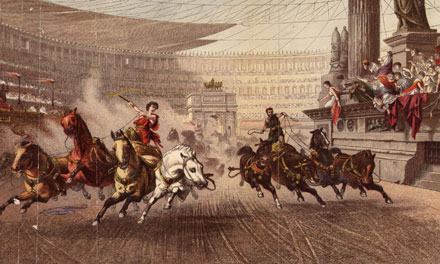
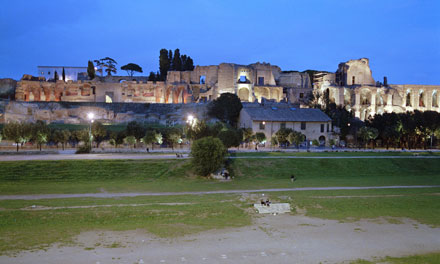
Hamarosan újra száguldó szekerek hangjától lesz hangos az Örök Város:
október közepén rendhagyó versenyre kerülhet sor a Circus Maximus
omladozó romjai között. Négyszáz éven át a kor Forma 1-es vetélkedőiként
kocsiversenyek szórakoztatták a közönséget: az ókorban a fogatok 2 vagy
4 lóval versenyeztek, és a képzett kocsihajtók egyes alkalmakkor akár 10
lovat is befoghattak maguk elé, hogy ezzel is lenyűgözzék a császárt. A
versenyeken több csapat küzdött egymással, és a nyertesek komoly
pénznyereményt és egyéb kitüntetéseket kaptak. A sikeres versenyzők a
korban hősök (mai kifejezéssel sztárok) voltak, ám ez a a legtöbbször
nem tartott sokáig, ugyanis életük igencsak rövid lehetett. Közülük is a
leghíresebb Scorpus volt, aki 2000 versenyt nyert meg, és halálát is a
pályán lelte egy végzetes ütközésben - alig 27 évesen. Híresek voltak a
versenylovak is, akik élete azonban még a versenyzőkénél is rövidebb
lehetett. A Vadis Al Maximo történeti társaság most azt találta ki, hogy
a város vezetőivel folytatandó sikeres tárgyalások után újjáéleszthetik
ezt a rendezvényt, persze kevesebb erőszakkal, mint azt a Ben Hur
ominózus képsorain láthattuk. A szervezet vezetője, Franco Calo szerint
az október 17-én kezdődő rendezvény három napig tart majd, pontosan
abban az időben, amikor a rómaiak is megrendezték a versenyt. |
|
 Historical
society
Vadis Al Maximo wants to
bring chariot racing back to the Circus Maximus.
Historical
society
Vadis Al Maximo wants to
bring chariot racing back to the Circus Maximus. 
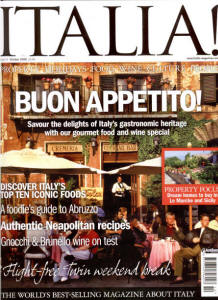
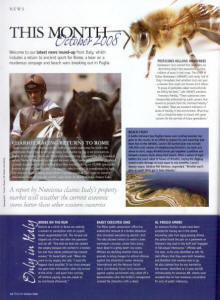
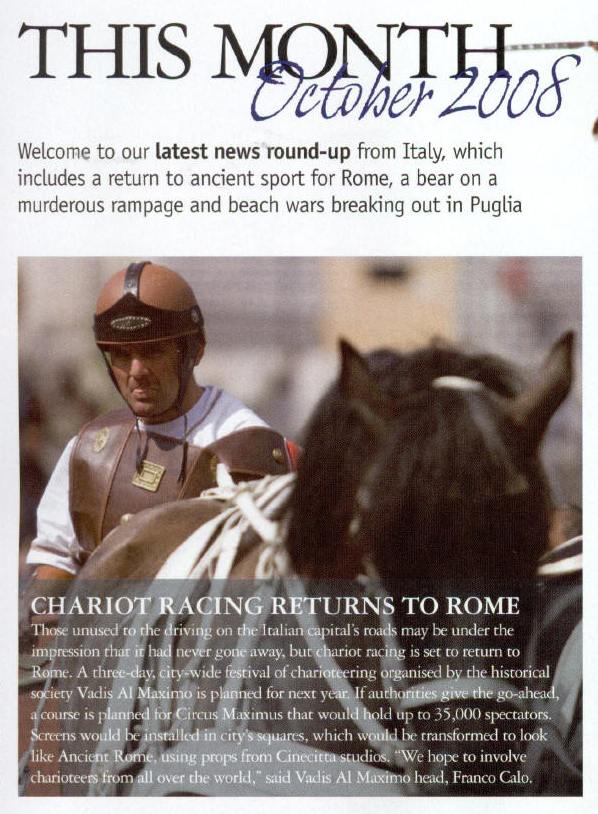









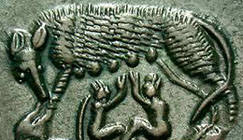




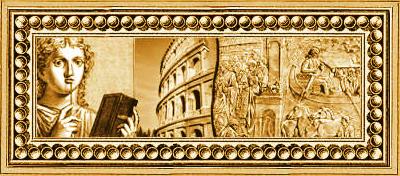














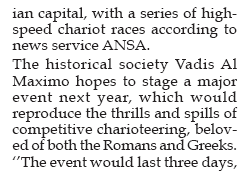


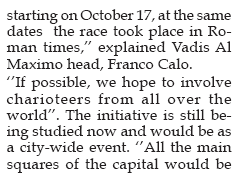
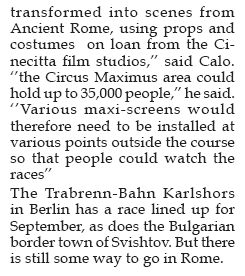















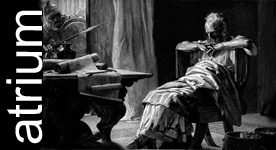






















 Историческое общество
Vadis Al Maximo собирается вернуть в Рим гонки на колесницах и ведет переговоры
с администрацией столицы Италии о том, чтобы возобновить в Большом цирке
ежегодные гонки на колесницах, проходившие во времена Римской империи. Проходить,
по замыслу организаторов, бега должны осенью с 17 по 19 октября.
Историческое общество
Vadis Al Maximo собирается вернуть в Рим гонки на колесницах и ведет переговоры
с администрацией столицы Италии о том, чтобы возобновить в Большом цирке
ежегодные гонки на колесницах, проходившие во времена Римской империи. Проходить,
по замыслу организаторов, бега должны осенью с 17 по 19 октября.
















